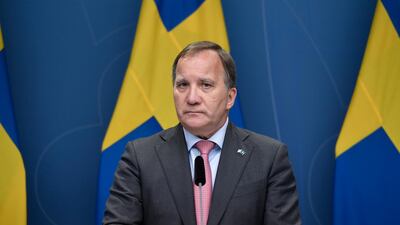Stefan Lofven has resigned a week after becoming the first Swedish leader to lose a no-confidence vote.
The Social Democrat did not call a snap election but instead asked the Speaker of the Swedish Parliament to begin the search for a replacement.
Andreas Norlen will ask the main party leaders if they can form a government. If that fails after four attempts, a snap election will have to be called. It would be the first such election in Sweden since 1958.
Mr Lofven lost the confidence vote on June 21 after the socialist Left Party withdrew its support following a clash about rent controls.
The government insisted on passing a new law that would have abolished Sweden’s system of setting rents by collective bargaining between landlords and the main tenants' union.
Mr Lofven, who will continue in a caretaker role until a new government is formed, led a fragile minority coalition with the Greens since 2018, relying on support from two small centre-right parties and the Left Party.
The centre-left and centre-right blocs are now evenly balanced and opinion polls show a general election might not change the picture.
Mr Lofven said "a snap election is not what is best for Sweden" because of the Covid-19 pandemic and the fact that a general election is due next year.
“The Speaker will now begin work on proposing a prime minister who can be tolerated by the Riksdag [the Parliament]," he said.
"The government will continue to govern the country for now but as the caretaking government.”
The last time coalition talks took place in Sweden was after the 2018 election that created a deadlocked Parliament. It took four months of negotiations to create the coalition government led by Mr Lofven.
In the present assembly, the left-leaning side and the centre-right bloc have about 40 per cent of the vote each.
None of the sides want to co-operate with the Sweden Democrats, a right-wing, populist party that is considered extreme.
The next general election is due to be held on September 11, 2022.
MATCH INFO
Uefa Champions League, Group B
Barcelona v Inter Milan
Camp Nou, Barcelona
Wednesday, 11pm (UAE)
'The Sky is Everywhere'
Director:Josephine Decker
Stars:Grace Kaufman, Pico Alexander, Jacques Colimon
Rating:2/5
WOMAN AND CHILD
Director: Saeed Roustaee
Starring: Parinaz Izadyar, Payman Maadi
Rating: 4/5
Real estate tokenisation project
Dubai launched the pilot phase of its real estate tokenisation project last month.
The initiative focuses on converting real estate assets into digital tokens recorded on blockchain technology and helps in streamlining the process of buying, selling and investing, the Dubai Land Department said.
Dubai’s real estate tokenisation market is projected to reach Dh60 billion ($16.33 billion) by 2033, representing 7 per cent of the emirate’s total property transactions, according to the DLD.
What are the influencer academy modules?
- Mastery of audio-visual content creation.
- Cinematography, shots and movement.
- All aspects of post-production.
- Emerging technologies and VFX with AI and CGI.
- Understanding of marketing objectives and audience engagement.
- Tourism industry knowledge.
- Professional ethics.
Zayed Sustainability Prize
UPI facts
More than 2.2 million Indian tourists arrived in UAE in 2023
More than 3.5 million Indians reside in UAE
Indian tourists can make purchases in UAE using rupee accounts in India through QR-code-based UPI real-time payment systems
Indian residents in UAE can use their non-resident NRO and NRE accounts held in Indian banks linked to a UAE mobile number for UPI transactions
MATCH INFO
English Premiership semi-finals
Saracens 57
Wasps 33
Exeter Chiefs 36
Newcastle Falcons 5
PROFILE OF HALAN
Started: November 2017
Founders: Mounir Nakhla, Ahmed Mohsen and Mohamed Aboulnaga
Based: Cairo, Egypt
Sector: transport and logistics
Size: 150 employees
Investment: approximately $8 million
Investors include: Singapore’s Battery Road Digital Holdings, Egypt’s Algebra Ventures, Uber co-founder and former CTO Oscar Salazar
What the law says
Micro-retirement is not a recognised concept or employment status under Federal Decree Law No. 33 of 2021 on the Regulation of Labour Relations (as amended) (UAE Labour Law). As such, it reflects a voluntary work-life balance practice, rather than a recognised legal employment category, according to Dilini Loku, senior associate for law firm Gateley Middle East.
“Some companies may offer formal sabbatical policies or career break programmes; however, beyond such arrangements, there is no automatic right or statutory entitlement to extended breaks,” she explains.
“Any leave taken beyond statutory entitlements, such as annual leave, is typically regarded as unpaid leave in accordance with Article 33 of the UAE Labour Law. While employees may legally take unpaid leave, such requests are subject to the employer’s discretion and require approval.”
If an employee resigns to pursue micro-retirement, the employment contract is terminated, and the employer is under no legal obligation to rehire the employee in the future unless specific contractual agreements are in place (such as return-to-work arrangements), which are generally uncommon, Ms Loku adds.
The Vile
Starring: Bdoor Mohammad, Jasem Alkharraz, Iman Tarik, Sarah Taibah
Director: Majid Al Ansari
Rating: 4/5
White hydrogen: Naturally occurring hydrogen
Chromite: Hard, metallic mineral containing iron oxide and chromium oxide
Ultramafic rocks: Dark-coloured rocks rich in magnesium or iron with very low silica content
Ophiolite: A section of the earth’s crust, which is oceanic in nature that has since been uplifted and exposed on land
Olivine: A commonly occurring magnesium iron silicate mineral that derives its name for its olive-green yellow-green colour
The specs: Rolls-Royce Cullinan
Price, base: Dh1 million (estimate)
Engine: 6.75-litre twin-turbo V12
Transmission: Eight-speed automatic
Power: 563hp @ 5,000rpm
Torque: 850Nm @ 1,600rpm
Fuel economy, combined: 15L / 100km

